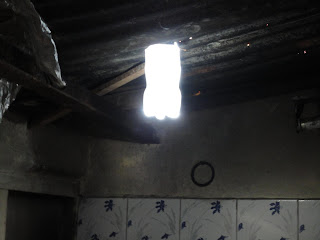Podar Students Light Up a Sewri Slum
Early October, we at GreenLine got a call from a student from R. A. Podar College of Commerce and Economics, stating that her group would like to do an environmental project, as it were one of the requirements in the management studies course. We agreed and from mid- October, it was decided that the seven students from the college-- Ruchita Waghela, Aparna Gopinath, Urvi Bhandare, Adwait Vaidya, Shardul Khatate, Prathamesh Shirolkar, and Sanjit Tambe would be working in the Sitagad area of Sewri East.
The students started their trips to Sewri on October 16, and their visits went on until November 10, excluding the Diwali week and Sundays. The four main topics that the students decided they wanted to work upon were those of energy use, water wastage, garbage segregation and the benefits of community gardening.
The initial days of the project went into introductions of people and the plans that were underway. The students interviewed a number of families understanding the ways of living and the grievances of the people in the slums. After having interviewed 30 families, the students decided to start working on the energy saving plan.
The plan was not one of grand proportions, and since the people living here lived in slums, their energy problems were different from energy problems that people living in residential buildings face. So one of the ideas was to introduce the water-bottle light in the houses. Fixed in the roofs of the different houses, these simple creations would hopefully save a whole lot of energy, and for these people, more importantly, save up on money that would be used in paying electricity bills.
Besides, this, the children and women, along with the volunteers also dug a compost pit, and an area for growing vegetables. The compost pit would be used for preparing wet compost from their plants, and their vegetables could be used for household as well as small-scale commercial purposes also. That took care of the issues of garbage segregation and of the vegetable garden.
 All in all, though the project itself may have not been a spectacular success, taking into account the people’s disinterest or inability to follow up on the various objectives, one thing was sure— the responsibility of making positive changes to the environment and to public and private lives depends, in a large way on one's readiness to change a few things altogether. Like the houses where we fixed the light bottles, there is the chance that the seed for future positive activity has been sowed.
All in all, though the project itself may have not been a spectacular success, taking into account the people’s disinterest or inability to follow up on the various objectives, one thing was sure— the responsibility of making positive changes to the environment and to public and private lives depends, in a large way on one's readiness to change a few things altogether. Like the houses where we fixed the light bottles, there is the chance that the seed for future positive activity has been sowed. 


_in_nest_in_Kolkata_I_IMG_2869.jpg)

Comments